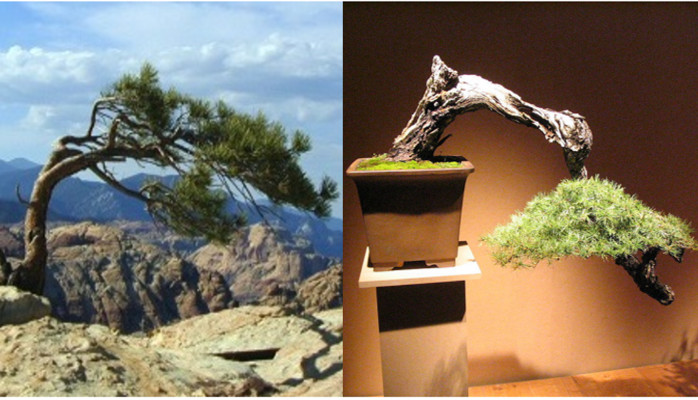
The dangers of confusing hobbies with business: a tale of bonsai and stunted trees
If you have a cactus garden, do not sell cactus bunches for Valentine's Day!
By George ILIEV
I hope you are not one of the millions of small companies and organisations that lead a meagre existence at the end of the tether: corner shops opposite a supermarket, startups that grow old without making it big, charities with a handful of employees, street sellers making $3 a day. These are the “stunted trees” of the business world.
Stunted trees grow above the treeline in the Arctic and in high mountains. The treeline separates the areas suitable for tree growth (with an average annual temperature of over 5 °C) from the areas too cold for trees (below 5 °C). Yet, it is not a sharp line but rather a band that may stretch up to 150 km wide in the forest-tundra transition zone in northern Canada. This is the zone where trees fade into “krummholz”.
Stunted trees cannot grow tall for one of two reasons:
1) lack of sufficient solar radiation and warmth, in the polar areas and high up in the mountains;
2) lack of rain in the transition zone around deserts.
In a similar way, many companies and organisations never make it big for two analogous reasons:
1) lack of a market for their products or services;
2) lack of investment.
"The Number 1 company-killer is lack of market," says US investor Marc Andreessen. Companies that only have a micro-market (e.g. a mom-and-pop store that caters to two streets) resemble the stunted trees that can only survive high in the mountains in a tiny ecological niche, usually sheltered by a rock.
If stunted trees are failing companies, bonsai trees are our hobbies
The bonsai tree is an exceptional member of the stunted tree category. These miniature trees exist in this form because we, humans, want them to be like this and intentionally deny them nutrients.
In the human world of businesses and organisations, the bonsai trees are not companies. They are our hobbies. They are rarely meant to be businesses: they are the blogs that do not profit from advertisement or the flower gardens maintained for pleasure rather than for commercial use.
Sometimes bonsai trees and stunted trees get confused in the startup world. Both arise from a personal passion and never make it big. However, there is a crucial difference. The bonsai is never meant to grow big. You don't need a 10 ha flower garden in your back yard. While if you run a flower-growing business that produces cactus leaves for flower bunches, you are clearly making the wrong product for the wrong market. Thus you would deservedly struggle to sell your cactus bunches for Valentine's Day (though you might be more successful for April Fools' Day).
A hobby can be pursued independently of the external environment because its existence is made possible by cross-subsidising. On the other hand, a startup always has to start from a market need and can only draw resources from its market.
For your business to succeed, do not plant your trees in the Arctic!
Humans have one advantage over trees. We pick where to plant our trees, while trees have no choice where they happen to be. So, if you want to grow your “business tree” tall, do not plant it in the Arctic. If you want your company to succeed, find a market first.
Shakespeare might have used this last sentence to wish good luck to all budding entrepreneurs with the following piece of advice:
"Neither a stunted tree, not a bonsai be!"
Strategic Projects, Innovation, Accreditation & China Director at AMBA (The Association of MBAs / AMBA & BGA) —— Advancing EdTech, Entrepreneurship & Management Education —— Co-Author of “The MBA Compass” (by Springer)
8y"Many prospective 'startup' businesses are dead on arrival... before they’ve ever really begun", says Forbes.
I have lived this, and completely agree with the premise - bravo, job well done!
立志如山, 行道如水: Startup Founder at Stealth Mode
8yDon't plant your trees in the Arctic is fine. But how about "Don't plant your cactus in the desert?" Some hobbies deserve to become businesses!